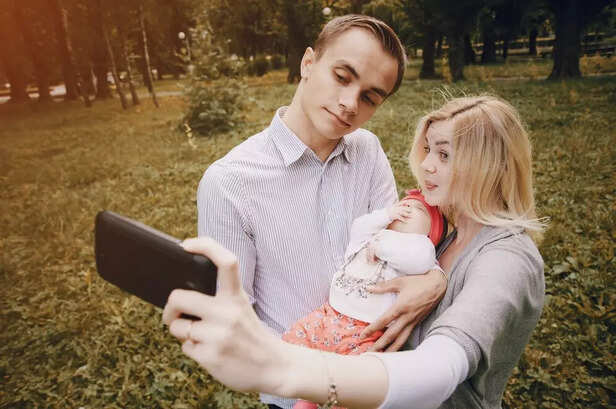When Love Comes with Terms and Conditions: A Look into Human Nature
Nidhi | Dec 28, 2024, 17:13 IST
The article delves into the complexities of love, exploring whether unconditional love truly exists or if all love inherently comes with terms and conditions. By examining human nature, societal conditioning, and real-life examples, it sheds light on how love operates as an emotional economy driven by needs, expectations, and boundaries. Ultimately, it argues for embracing the conditional nature of love as a pathway to healthier, more authentic relationships.
Love — a word that has inspired poetry, songs, and dreams. We’re taught to believe it’s the ultimate act of selflessness, an emotion so pure that it defies logic and boundaries. But as we step out of the realms of fairy tales and into the real world, a pressing question arises: Does unconditional love truly exist, or is it an illusion shaped by our desires and needs? To answer this, we need to journey through the layers of human nature and unravel whether love is a natural force or something deeply conditioned by our experiences.
 Love, as beautiful as it sounds, often comes with its own fine print. It may not always be spoken out loud, but it’s there—hidden in actions, expectations, and silent agreements. Think of a friendship where one person consistently supports the other through tough times, yet when roles reverse, the support doesn’t come back. Over time, resentment creeps in, and the bond begins to fracture. This isn’t a failure of love; it’s an example of how love often comes with unspoken terms.
Love, as beautiful as it sounds, often comes with its own fine print. It may not always be spoken out loud, but it’s there—hidden in actions, expectations, and silent agreements. Think of a friendship where one person consistently supports the other through tough times, yet when roles reverse, the support doesn’t come back. Over time, resentment creeps in, and the bond begins to fracture. This isn’t a failure of love; it’s an example of how love often comes with unspoken terms.
Romantic relationships amplify this further. Imagine a couple deeply in love, but one partner repeatedly prioritizes their work over spending time together. While there’s love, the unmet need for attention can make the other partner feel neglected. Love here isn’t lost—it’s conditional, rooted in emotional needs that demand fulfillment.
 As humans, we’re wired for connection. Evolutionarily, love and attachment have been tools for survival. A parent’s love ensures the care and safety of a child, while romantic bonds strengthen the chances of procreation and partnership. But even these seemingly “selfless” forms of love have conditions. A parent may find their affection strained if their child’s behavior clashes with deeply held values, and a partner may drift away when their emotional or physical needs are consistently unmet.
As humans, we’re wired for connection. Evolutionarily, love and attachment have been tools for survival. A parent’s love ensures the care and safety of a child, while romantic bonds strengthen the chances of procreation and partnership. But even these seemingly “selfless” forms of love have conditions. A parent may find their affection strained if their child’s behavior clashes with deeply held values, and a partner may drift away when their emotional or physical needs are consistently unmet.
Conditioning also plays a significant role. From childhood, we’re shaped by societal expectations of what love should be. Parents may tie affection to achievements (“I’m proud of you when you do well in school”), and cultural narratives romanticize love as everlasting and forgiving. These early lessons teach us that love isn’t always freely given but often earned—a belief we carry into adulthood.

At its core, love is an emotional exchange. While the notion of “love without limits” is inspiring, most relationships operate on an emotional economy. Needs such as validation, trust, and security often form the foundation of this economy. Consider these examples:
Romantic Love: A partner might seek emotional support or intimacy. When these are absent, love can begin to feel hollow.
Parental Love: While parents are often considered the epitome of unconditional love, they may expect obedience or gratitude in return for their sacrifices. When these expectations aren’t met, feelings of disappointment can arise.
Friendship: Friends often rely on shared interests and mutual respect. A friendship can break down if one person feels the other isn’t dependable.
Take Maya and Arjun’s story. Maya feels emotionally neglected because Arjun is engrossed in his work. Arjun loves Maya deeply, but his inability to meet her need for attention and connection strains their relationship. Their love, though genuine, highlights the implicit conditions that come with it.

The idea of unconditional love is comforting but often impractical. Even the purest forms of love have limits. For instance, consider a parent who tirelessly supports their child. If the child grows up to cause harm or disregard the parent’s values, the bond may weaken. Similarly, in romantic relationships, enduring toxic behavior or repeated betrayal is not a testament to love but a disregard for self-worth.
Spiritual leaders like the Dalai Lama promote compassion and universal love, yet even these teachings recognize boundaries. Loving unconditionally doesn’t mean tolerating harm or neglecting self-respect. Instead, it’s about striving for empathy while maintaining personal boundaries.

Society has a profound influence on how we perceive and express love. Media often glorifies love as eternal and forgiving, setting unrealistic expectations. Social norms, too, dictate what love should look like:
In some cultures, parental approval becomes a condition for romantic relationships.
Financial stability and social status often shape marital decisions, adding layers of conditionality to love.
Gender roles impose expectations, such as men being providers and women being nurturers, further complicating the dynamics of love.
These societal narratives often clash with personal experiences, creating a tension between idealized and practical love.

Rather than viewing conditional love as a flaw, it’s more constructive to see it as a framework for healthy relationships. Here’s how we can navigate love’s inherent conditions:
Communicate Openly: Discuss needs and expectations early in relationships. For example, a couple might agree to prioritize quality time despite busy schedules.
Cultivate Empathy: Understand that everyone has unique needs and triggers. Empathy can bridge gaps in expectations.
Practice Reciprocity: Healthy relationships thrive on mutual effort. A balance of giving and receiving strengthens bonds.
Value Self-Love: Loving oneself is the foundation for healthier connections. It ensures self-worth isn’t entirely dependent on external validation.

Despite its conditions, love remains one of the most profound human experiences. Moments of selflessness—a mother staying up all night with her sick child, a friend offering unwavering support during a crisis, or a partner standing by through life’s storms—prove that love can transcend expectations, even if temporarily. These acts, while not entirely devoid of conditions, showcase love’s ability to adapt and grow.
Love, as much as we romanticize it, is neither entirely unconditional nor purely transactional. It’s a dynamic interplay of emotions, needs, and expectations. Recognizing its conditional nature allows us to approach relationships with greater authenticity and care. After all, it is in the balancing act of giving and receiving, setting boundaries while embracing vulnerability, that love finds its deepest meaning.
The Fine Print of Love

Love
Romantic relationships amplify this further. Imagine a couple deeply in love, but one partner repeatedly prioritizes their work over spending time together. While there’s love, the unmet need for attention can make the other partner feel neglected. Love here isn’t lost—it’s conditional, rooted in emotional needs that demand fulfillment.
Are We Born to Love with Conditions?

Human Nature
Conditioning also plays a significant role. From childhood, we’re shaped by societal expectations of what love should be. Parents may tie affection to achievements (“I’m proud of you when you do well in school”), and cultural narratives romanticize love as everlasting and forgiving. These early lessons teach us that love isn’t always freely given but often earned—a belief we carry into adulthood.
The Emotional Economy of Love

Couples
At its core, love is an emotional exchange. While the notion of “love without limits” is inspiring, most relationships operate on an emotional economy. Needs such as validation, trust, and security often form the foundation of this economy. Consider these examples:
Romantic Love: A partner might seek emotional support or intimacy. When these are absent, love can begin to feel hollow.
Parental Love: While parents are often considered the epitome of unconditional love, they may expect obedience or gratitude in return for their sacrifices. When these expectations aren’t met, feelings of disappointment can arise.
Friendship: Friends often rely on shared interests and mutual respect. A friendship can break down if one person feels the other isn’t dependable.
Take Maya and Arjun’s story. Maya feels emotionally neglected because Arjun is engrossed in his work. Arjun loves Maya deeply, but his inability to meet her need for attention and connection strains their relationship. Their love, though genuine, highlights the implicit conditions that come with it.
The Myth of Unconditional Love

Unconditional Love
The idea of unconditional love is comforting but often impractical. Even the purest forms of love have limits. For instance, consider a parent who tirelessly supports their child. If the child grows up to cause harm or disregard the parent’s values, the bond may weaken. Similarly, in romantic relationships, enduring toxic behavior or repeated betrayal is not a testament to love but a disregard for self-worth.
Spiritual leaders like the Dalai Lama promote compassion and universal love, yet even these teachings recognize boundaries. Loving unconditionally doesn’t mean tolerating harm or neglecting self-respect. Instead, it’s about striving for empathy while maintaining personal boundaries.
Society’s Role in Shaping Love

Family
Society has a profound influence on how we perceive and express love. Media often glorifies love as eternal and forgiving, setting unrealistic expectations. Social norms, too, dictate what love should look like:
In some cultures, parental approval becomes a condition for romantic relationships.
Financial stability and social status often shape marital decisions, adding layers of conditionality to love.
Gender roles impose expectations, such as men being providers and women being nurturers, further complicating the dynamics of love.
These societal narratives often clash with personal experiences, creating a tension between idealized and practical love.
Embracing the Conditions of Love

Lovely Couple
Rather than viewing conditional love as a flaw, it’s more constructive to see it as a framework for healthy relationships. Here’s how we can navigate love’s inherent conditions:
Communicate Openly: Discuss needs and expectations early in relationships. For example, a couple might agree to prioritize quality time despite busy schedules.
Cultivate Empathy: Understand that everyone has unique needs and triggers. Empathy can bridge gaps in expectations.
Practice Reciprocity: Healthy relationships thrive on mutual effort. A balance of giving and receiving strengthens bonds.
Value Self-Love: Loving oneself is the foundation for healthier connections. It ensures self-worth isn’t entirely dependent on external validation.
The Beauty in Love’s Imperfections

Rekha Ji
Despite its conditions, love remains one of the most profound human experiences. Moments of selflessness—a mother staying up all night with her sick child, a friend offering unwavering support during a crisis, or a partner standing by through life’s storms—prove that love can transcend expectations, even if temporarily. These acts, while not entirely devoid of conditions, showcase love’s ability to adapt and grow.
Love, as much as we romanticize it, is neither entirely unconditional nor purely transactional. It’s a dynamic interplay of emotions, needs, and expectations. Recognizing its conditional nature allows us to approach relationships with greater authenticity and care. After all, it is in the balancing act of giving and receiving, setting boundaries while embracing vulnerability, that love finds its deepest meaning.
